Abstract
Introduction: Solid waste management is becoming an increasing public health concern. Negative effects of improper waste management are seen throughout the world. Gazipur, Bangladesh is among the most polluted cities worldwide. One of the greatest concern of this city is solid waste management. This research aimed to examine the community behavior and practices on households’ solid waste management in selected urban areas in Gazipur.
Materials and Methods: A field survey was conducted through convenience sampling in Datta Para and Board Bazar, Gazipur with a focus on microcredit borrowers. Data was collected through structured interviews and focus group discussions by which we were able to analyze knowledge, attitude, intention, practice and advocacy among residents, with access to financial resources to improve household waste management behavior.
Results: Microfinance borrowers of Datta Para and Board Bazar have knowledge regarding household solid waste management. Socio-economic factors contribute to solid waste practices. 98% and 90% of respondents respectively believe proper waste management brings health and economic benefits. Females (63.4%) were more aware than males (44.4%) about waste management. Those with higher education and income demonstrated better waste management behaviors. Extra income from microcredit is not used to improve household waste management behaviors of the borrowers.
Conclusion: Solid waste generated from households need proper management to minimize environmental and human health risks. Respondents from Datta Para and Board Bazar are interested in improved solid waste management. Other incentives or changes in the household system are required before additional income is spent on household solid waste management.
Keywords: Solid waste; Waste management; Environmental Health; Microcredit; Bastob NGO Abbreviations: Board Bazar (BB); City Corporation (CC); Cities Development Initiative in Asia (CDIA); Coastal Towns Environmental Infrastructure Project (CTEIP); Datta Para (DP); Focus Group Discussion (FGD); Gazipur City Corporation (GCC); Green Productivity (GP); Independent University of Bangladesh (IUB); International Solid Waste Association (ISWA); Japan International Cooperation Agency (JICA); knowledge, attitude, intention, practice, and advocacy (KAIPA); Non-governmental Organization (NGO); Solid Waste Management (SWM); Statistical Package for the Social Sciences (SPSS); University of Maryland (UMD); Waste Management (WM); World Health Organization (WHO)
Introduction
Waste Management from a Global Perspective Generation of waste, including household solid waste, is, the unwanted, nonsoluble by-product of what is used to sustain everyday life. Waste comes in a variety of forms, from multiple sources, and described in numerous ways. It can be reused, repurposed, and even transformed [1]. Depending upon how it is managed or discarded, waste could be harmful or useful. According to the World Bank, an average of 1.3 billion tons of solid waste is produced every year globally. This estimation is projected to increase to 2.2 billion tons by 2025 [2,3]. Although waste generation is increasing, there remains significant deficiencies worldwide with regards to waste management (WM). As a result, the public’s health and local environments are at risk, requiring collaboration with municipalities, public-private partnerships, NGOs, and the community to address these issues thereby protecting land and human health and well-being [4].
Waste Management in Asia
Asia is the fastest growing region worldwide, with over four billion people making up more than 60 percent of the world’s population. The urban population in Asia is growing by about 2.3 percent annually. Consequently, waste generation in Asia has increased rapidly over the last decade. According to the World Bank, 450,000 to 760,000 tons of waste is generated in urban areas per day and is expected to reach about 1.8 million tons per day by 2025. With waste in Asia rising and fast regional economic growth, cities are struggling to handle the burgeoning waste volume [5]. These struggles have led to the following WM issues:
- Misusing natural resources and not using local human resources
- Less motivation and support from national level
- Necessity of research on low-cost composting
- Less study opportunity on transforming two operations of composting and primary collection into micro-enterprises
- Massive upsurge in urban population is increasing garbage generation
- Lack of communication between the government and NGOs
- People migrating from rural areas to cities
- Rapid and unplanned urbanization
- Low rate of waste collection [5].
In Asian developing countries the main disposal methods for municipal solid waste are open dumping and sanitary landfill. The environmental condition of uncontrolled dumpsites is extremely vulnerable causing severe environmental pollution [5] and local health risks. Several methods, among them Green Productivity (GP), help municipalities to address such issues [5].
The governments of Asian countries realize that GP - reduction, recycling, reuse, and recovery - are essential elements of Solid Waste Management (SWM) which can be used to check the rapid growth rate of wastes in cities. National awareness campaigns on GP measures are held to promote recycling activities. Waste segregation is the initial stage for GP practices. Residents are encouraged to separate their waste and bring it to the appropriate locations for collection or make it available for household pickup. Paper, scrap metal, glass, and plastic are the common items segregated and collected by waste pickers who play a significant role in recycling activities. Waste pickers collect sellable items from waste-collection bins, households, and dumpsites. As well, organic waste is converted into compost in several cities as part of their recycling activities. However, the rate of recycling in Asian developing countries is far from satisfactory. The low recycling rate can be attributed to poor strategic planning and the lack of implementation and enforcement of policies. Lack of good incentives and lack of demand can also be a main factor in a low waste recycling rate. GP measures for SWM not only reduce waste, but also recover useful resources. Some Asian cities have long-term plans for zero-waste generation. Even though it might be a difficult task to achieve in the near future, measures and policies are being developed to move toward zero-waste generation [6].
Bangladesh is the 8th most populous country and 10th most densely populated country in the world with a population density of 3,276 people per square mile [7,8]. As of December 10, 2017, Bangladesh had an estimated population of about 165,419,700. From this, 35.7% is estimated as the urban population [8]. Due to lower infrastructure levels in rural areas, an average 54% of the population are migrating to urban areas yearly [8]. This massive population growth leads to increasing problems with WM systems in the larger cities of Bangladesh. According to Prothom Alo [9], the World Health Organization (WHO) reports Gazipur is one of the most polluted cities in the world and one of the greatest concern of this city is the management of solid waste [9]. Due to inadequate land size and higher population, this city faces the burgeoning problem in managing waste. Additionally, several other problems like insufficient use of natural resources, unplanned urbanization and drainage system, rapid migration, lack of communication and coordination between private and public sectors, and rapid industrialization has made WM in Gazipur a pressing global and environmental public health challenge which needs to be addressed by the people and government of Gazipur.
The municipal solid waste of Gazipur city is mainly managed by Gazipur City Corporation (GCC) and the communities. A large quantity of solid waste, almost 600 tons, is produced daily in Gazipur. However, there is a lack of dumping sites and sanitary landfills, equipment and garbage trucks to properly collect and dispose of the waste. Garbage collection follows two methods - primary and secondary. Primary collection involves door-to-door garbage collection with a van wherein collected wastes are then removed to roadside bins which are managed by the communities and pickers. City Corporation (CC) then collects garbage from roadside bins and takes it to the final disposal sites of Nimtali. Unfortunately, GCC has not been able to maintain regularity with roadside waste collecting. Additionally, bureaucratic hindrance and lack of observation, monitoring, supervision and coordination of waste removal, combined with internal problems in GCC has created an insufficient WM system[10]. Bangladesh WM follows strategies like other Asian countries such as landfilling, incineration, source reduction, and recycling. Though it is lagging other countries in proper SWM system and self-awareness about environmental cleanliness, Bangladesh began taking some required steps towards reducing these problems. Per Nasrin [10], different private and public sectors of Bangladesh have organized public awareness building workshops, meetings, seminars, rallies, and campaigns across the country. GCC also has an action plan containing a project priority list. The Japan International Cooperation Agency (JICA) has supported projects to improve water supply, drainage and road networks, and have also arranged a Crash Program for cleaning Gazipur city. Planning of other projects like solid waste treatment plants are also taking place [7]. For improvement of the environment and proper WM, these are all steps in the right direction.
Negative Impacts of Improper Waste Management Rapid migration and urbanization have resulted in improper WM thereby creating negative impacts on Gazipur city. Health, environment, social, and economic problems have become major concerns of this city, and improper and incomplete WM contributes to the concerns. Open dump sites, unmanaged dustbins and uncollected roadside wastes represent risk factors of spreading to individuals such severe illnesses such as hepatitis, cholera, plague, rabies, and aspergillosis. It also increases risk of mosquito breeding and unpleasant odor in surrounding areas, the latter resulting in nausea and vomiting for some people. Uncollected solid wastes also create environmental problems like obstructing footpaths and streets after storms which results in flooding and waste pile leachate running off into streams thereby contaminating the water supply [11]. For these reasons organizations in Bangladesh such as Waste Concern have implemented projects and formed partnerships with community members to address WM issues in Gazipur [16].
Research Objectives Recognizing the significant impact that SWM has on GCC, students from the Schools of Public Health at Independent University of Bangladesh (IUB) and University of Maryland (UMD) designed a study to better understand how best to address the issue. Students are interested in finding ways to work with the people of Gazipur who are taking microfinance, to improve their habits thereby minimizing the effects previously discussed. The aim of the study is to observe the knowledge, attitude, intention, practice, and advocacy (KAIPA) of microcredit borrowers regarding SWM. The objectives of this research study are: 1. Analyze the behavior (KAIPA) of microcredit borrowers of Gazipur City, Bangladesh on household SWM 2. Assess existing pattern of solid waste recycling 3. Investigate how socioeconomic factors such as gender, income, education, and employment impact on WM behavior 4. Examine public health practices of microcredit borrowers
Materials and Methodology
Study design
To determine how WM problems affect microcredit borrowers in Gazipur City Corporation (GCC), a cross-sectional study design with convenience sampling, was used. Such a design allowed investigators to look at exposure, in this case waste, at one point in time, though using a small sample size [14]. It provided a snapshot of the problem that was used to determine how exposure to waste, and microcredit, impact people’s understanding of the problem and their response to it. The sample size of 50 was selected by consensus from IUB and UMD professors and students, with only two days to complete the household interviews.
Study Area and Population To determine the behavior of microcredit borrowers, two areas Datta Para and Board Bazar are selected from Gazipur (GCC), Bangladesh. The areas were identified with the support of Bastob, a local Non-Governmental Organization (NGO) that runs a Microfinance program in those areas. 50 households were identified from the two areas for data collection. GCC is located in the center of Bangladesh (Figure 1). It connects the northern region of the country to the capital city, Dhaka. This connection, has made GCC an enticing place for industries to invest in. GCC has 57 wards - DP is located in Ward 33 with 2300 households and BB is located in Ward 48 with 2800 households [12]. The area of GCC (Figure 2) is 329.53 sq.km. with a population of 2,500,000 [13]. There are 7 vehicles used for solid waste collection and dumping in specific locations in GCC, with plans to acquire 40 acres of land for dumping and construction of three dumping stations. At the time of this study, Cities Development Initiative in Asia (CDIA), funded by Asian Development Bank was working on improving SWM along with roads, drains and water supply [12]. How well the people of DP and BB understand what role CC plays in the removal of solid waste will also be identified via household interviews and FGD.
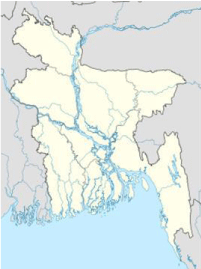
Figure 1: Map of Bangladesh.
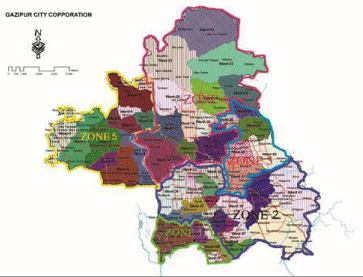
Figure 2: Map of Gazipur City Corporation.
Data Collection Methods & Techniques
Data collection was done using a household interview method through structured questionnaires which were administered to 50 household members in BB and DP. In addition to household interviews, two Focus Group Discussions (FGD) were conducted with householders at the office of Bastob. The FGD conducted with a total of 19 participants -10 from BB and 9 from DP. Each FGD lasted 3 hours. Students from UMD assisted IUB students with creating the questionnaire. The questionnaire consisted of six modules: (1) socio-economic information (2) knowledge of SWM (3) attitudes towards SW (4) intentions towards improving SWM (5) advocacy towards improving SWM and (6) practice of household SWM. Each module is designed to gain a better understanding of how community members feel about the growing problems of WM. Conducting household interviews also allowed researchers to build relationships with community member which will help build the people’s trust thereby making them more receptive to future interactions. Once consensus was reached, IUB students visited the home of residents in DP and BB for two days. Household members were asked if they would like to participate in the study. Those who agreed were asked to sign a consent form. The goal was to obtain as much relevant information as possible to provide a clearer picture of the WM problem and the people’s reactions to it, especially as it relates to health and household economic behavior. We were also interested in learning how microcredit is used in this community to address WM issues. We also looked at how socioeconomic status, gender, and age influence people’s decision to practice proper WM behaviors, in addition to how increased income from microcredit influenced their intentions to be more conscientious regarding household waste management. Information obtained was used to identify the independent and dependent variables as illustrated in (Table 1). Identifying these variables will further assist investigators moving forward as well as determine what subset of the population to target. Data analysis was done by IUB students with input from UMD students regarding relevant findings, using version 23.0 of the Statistical Package for the Social Sciences (SPSS) software. Findings from the analysis will provide a clearer understanding of the problems and the people’s response to said problems will enable Bastob to create an environmental health education campaign plan(s) to improve waste management.
Independent Variables
Dependent Variables
Age
Knowledge
Gender
Practice
Education
Attitude
Occupation
Advocacy
Income
Intention
Type of home
Recommendations
Table 1: Independent and dependent variables associated with household waste management in Board Bazar and Datta Para, Gazipur City Corporation, Bangladesh.
Results
Study Findings All the microcredit borrowers – 69 in total, answered questions related to their KAIPA on household and SWM. (Table 2) breaks down the age, sex, and socioeconomic status of the household respondents on location. In both areas many of the respondents were females (70% BB; 90% DP) between 31-40 years old (45% BB; 47% DP). In BB, 85% of respondents owned their own homes whereas 97% of those in DP were homeowners; there are significant differences in the type of home participants from these areas. We also found that a significant number of respondents work from home (49% BB; 50% DP) even though several have higher secondary to post graduate education. When gender differences are compared with knowledge, 90% of female respondents and 100% of male respondents from BB and DP reported having knowledge about SWM (Table 3). The education level of the 10% of females who were unaware of SWM fall between class 1 (equivalent to U.S. primary school) to SSC/HSC (equivalent to U.S. middle/high school). (Figure 3) shows the amount of kitchen wastes produced in Datta Para, 29%, is higher than Board Bazar which is 39%. However, plastic, fabric, and paper wastes are produced more in Board Bazar than in Datta Para. Using household garbage buckets with lids inhibits access of potential disease vectors such as rodents and flies and reduces odors attracting pests. Regarding income, 20% of respondents in BB with a monthly income from 20,001- 25,000 BDT use buckets with lids for storing wastes whereas 10% with an income between 6,000- 10,000 BDT & 25,001- 30,000 BDT use plastic bags for storing wastes (Figure 4). Approximately 10% of respondents with monthly incomes between 25,001 BDT - 30,000 BDT use buckets without a lid to store household wastes. Results in DP are similar; a majority of respondent with higher incomes use buckets without a lid to store wastes. Out of those respondents, only 10% with a monthly income of 35,000+ BDT and 7% between 30,001- 35,000 BDT use buckets with lid. This indicates that those with a higher income are less concerned about the importance of using buckets with lid. In (Figure 5) most of the respondents from BB separate dry and wet wastes. But the range of respondents who don’t separate their wastes and passed class 6-9 (U.S. middle school) is higher than other ranges. Moreover, other respondents mentioned that they will separate wastes if needed. Most respondents from DP who passed and graduated from SSC/HSC (U.S. middle - high school) separate their dry and wet wastes. However, less formal-educated respondents were unwilling to do likewise.
Board Bazar
Datta Para
N
%
N
%
Age group
21-30
4
20
9
30
31-40
9
45
14
47
41-50
5
25
6
20
51 or more
2
10
1
3
Sex
Female
14
70
27
90
Male
6
30
3
10
Ownership of Respondent's Home
Rented
3
15
1
3
Own
17
85
29
97
Type of Home
Apartment
0
0
6.7
2
Tin shed
12
60
8
27
Brick house
7
35
10
33
Others
1
5
10
33
Occupation
Work at home
8
40
15
50
Small Business
5
25
1
3
Big Business
0
0
2
7
Factory worker
0
0
1
3
Service
3
15
1
3
Skilled Labor
1
5
1
3
Agricultural Labor
0
0
1
3
Work at Poultry firm
1
5
1
3
Handicraft
1
5
1
3
Work as maid
1
5
0
0
Others
0
0
6
20
Educational Status
No education
4
20
3
10
Primary
6
30
6
20
Secondary
4
20
4
13
Higher secondary
1
5
9
30
Graduate
3
15
8
27
Post Graduate
2
10
0
0
Board Bazar
Datta Para
N
%
N
%
Age group
21-30
4
20
9
30
31-40
9
45
14
47
41-50
5
25
6
20
51 or more
2
10
1
3
Sex
Female
14
70
27
90
Male
6
30
3
10
Ownership of Respondent's Home
Rented
3
15
1
3
Own
17
85
29
97
Type of Home
Apartment
0
0
6.7
2
Tin shed
12
60
8
27
Brick house
7
35
10
33
Others
1
5
10
33
Occupation
Work at home
8
40
15
50
Small Business
5
25
1
3
Big Business
0
0
2
7
Factory worker
0
0
1
3
Service
3
15
1
3
Skilled Labor
1
5
1
3
Agricultural Labor
0
0
1
3
Work at Poultry firm
1
5
1
3
Handicraft
1
5
1
3
Work as maid
1
5
0
0
Others
0
0
6
20
Educational Status
No education
4
20
3
10
Primary
6
30
6
20
Secondary
4
20
4
13
Higher secondary
1
5
9
30
Graduate
3
15
8
27
Post Graduate
2
10
0
0
Table 2: Household respondents’ socio-economic characteristics by location.
Female
Male
Yes
No
Yes
No
Not pass class I
6
0
1
0
Class I- V
9
1
2
0
Class VI- IX
4
2
2
0
SSC, HSC Equivalent
7
1
1
0
Graduate
9
0
0
0
Post Graduate
2
0
0
0
Total (%)
90
10
100
0
Table 3: Knowledge about solid waste management based on education.
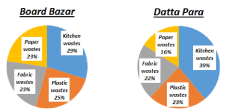
Figure 3: Amount of waste produced based on location.
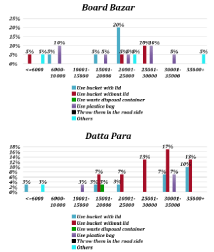
Figure 4: Storage of waste before disposal in survey areas based on monthly
income.
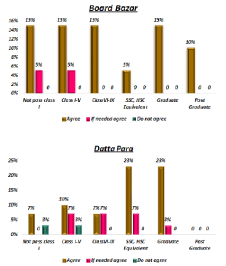
Figure 5: Separating dry and wet wastes in survey areas based on education.
In BB, 55% of household wastes are collected by community waste collectors. Only half of these collectors maintain regularity in collecting wastes. Whereas in DP, 47% people dispose their wastes themselves with 27% of household wastes collected by community waste collectors (Figure 6). (Table 4) shows how much people from BB and DP pay waste collectors monthly, with 95% and 50% respectively paying BDT 20 - BDT 200 for trash removal.
BDT 0
BDT 20-50 B
BDT 50-100
BDT 100-200
No response
Board Bazar
5%
60%
0%
35%
0%
Datta Para
33%
13%
20%
17%
17%
Table 4: Cross tabulation of payment of waste collectors based on survey area.
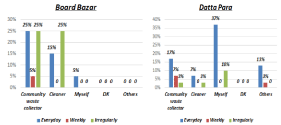
Figure 6: Time of collecting wastes by the waste collectors based on survey
area.
Most people from both areas lack knowledge regarding the final location of solid wastes disposal (Table 6). 38% of respondents mentioned that after collecting the wastes from their homes, collectors throw waste beside the rivers and 16% mentioned that waste collectors throw their wastes at the roadsides. But they don’t know what the waste collectors do with their wastes otherwise, nor where it is finally disposed.
Almost 100% respondents from BB and DP agreed that proper WM brings health and economic benefits (Figure 7 and Figure 8). A small percentage of respondents from DP do not see such benefits. Regarding microcredit, 67% of male respondents and 44% of female respondents want to use profits for building or repairing homes and 33% male and 24% female want to invest in their own business. Only 24% of female respondents want to use the profit for house cleaning and only 2% for health services (Figure 9).
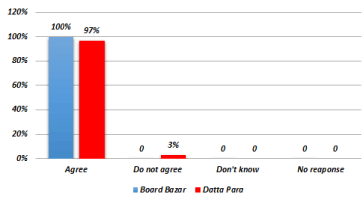
Figure 7: Respondents perception of health benefits from proper waste
management based on survey area.
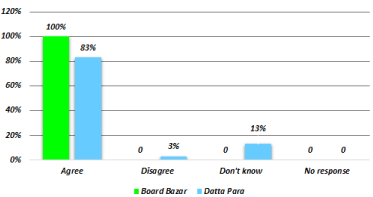
Figure 8: Respondents perception of economic benefits from proper waste
management based on survey area.
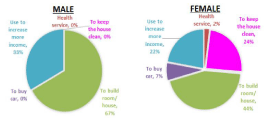
Figure 9: Usage of profits from microfinance based on monthly income.
Recycling is a term most respondent do not know about (Table 7), but they know how to use water bottles as flower pots and use egg shells and tea leaves for fertilizer. Some of the participants in FGD mentioned that they use vegetable waste as food for cows and to make fertilizer for their garden. Most agreed to attend training on recycling if any community or CC organizes such an initiative.
Discussion
Implications and Recommendations Based on household interviews, FGD, and observations of WM practices, we have determined that most of the respondents in both communities are interested in solving WM issues (Table 5 and Table 7). However, their community has not created a functional system by which this is possible. Waste collectors are not collecting waste daily. Instead, waste is collected twice a week. To remove solid waste from their homes, household members dispose their wastes along roadsides and rivers and ponds. When community waste workers do collect waste, it is taken to landfills. The steps that CC takes are not enough to complete the tasks. According to the number of people living in BB and DP, and the amount of waste produced, the numbers of waste collectors are insufficient. It is recommended that CC provides more staff to collect waste and keep the roadsides, drains and surrounding areas clean. Several practical solutions can be implemented to address the lack of community workers. One solution would be to employ more community waste workers. However, due to insufficient funding this isn’t always possible. Creating a program within microcredit that allots funding to be distributed for the sole purpose of WM would address the economic constraints, at least in some parts of the communities. Furthermore, providing incentives for microcredit borrowers to take action in their community regarding improved solid waste disposal would further address the shortage of community workers. Bastob could consider creating programs where select microcredit borrowers would be responsible for collecting waste from their community and helping to keep the roadside and drains clean by sweeping regularly. Waste Concern and the local government could also support such an action. Waste Concern already has several model projects in place to address SWM problems. These projects could be implemented by GCC. Two such projects may benefit BB and DP are the 3R (Reduce, Reuse and Recycle) Pilot Initiative. Within the 3R project, Waste Concern could offer “capacity building training and income generating activities” in association with GCC [16]. Waste Concern could also provide materials that will increase awareness on “waste recycling, composting and segregation of waste” for members of the community, GCC and Bastob [16]. A second project which may benefit the people of Gazipur is Waste Concern’s Consultancy Services for Sanitation and SWM under the DDS Consultant, Coastal Towns Environmental Infrastructure Project (CTEIP). This project can provide CC a framework for implementing SWM systems to include engineer design reports, cost estimates, and various other documents to facilitate the system [16]. The implementation of both projects could provide important health and economic benefits to the people of Gazipur. However, both would require government funding and support in addition to a commitment from GCC and community affiliates. Creating policies to address SWM is one way to advance the commitment from GCC. This will also create a sense of trust within the community. Examples of such policies include: (1) Number of times during a week GCC is responsible for collecting household waste, (2) Guidelines on how to dispose of household waste - this could include special instructions on separating and recycling waste and proper disposal of special items like electronics and medical supplies, (3) Designated dumpsites for GCC to take household waste with plans to build a WM plant and (4) Restrictions on where waste can be dumped within Gazipur City. Knowing that work is being done by GCC because of established policies dedicated to improving their living conditions may increase community involvement. There can also be economic benefits to implementing policies. The local government could establish fines for improper waste disposal by workers of GCC and members of the community. Fines could be used to make further improvements, employ additional workers or contribute to financing a waste plant construction project. Fines may also inadvertently increase improved WM practices of Gazipur citizens as they take necessary steps to comply with new policies. Respondents also acknowledge that having self-awareness of WM problems can be more helpful than depending completely on GCC. To provide community members more knowledge to improve their WM habits, environmental health educational campaigns are needed. These campaigns can be created by Bastob in collaboration with local university, households, schools, and local communities. This would be especially beneficial for young children, so they grow up learning both the importance of WM and how to properly manage household waste.
Yes (%)
No (%)
Board Bazar
Datta Para
Board Bazar
Datta Para
<=6000
4
4
0
0
6000-10000
6
0
0
0
10001-15000
0
0
0
2
15001- 20000
4
8
0
0
20001-25000
14
4
0
0
25001-30000
4
8
4
0
30001-35000
2
16
0
2
35000+
2
10
0
4
Total (%)
36
50
4
10
Table 5: Respondents are willing to pay more for better service based on monthly income of the survey areas.
N
%
Any idea about final disposal
Yes
36
72
No
14
28
Location of the final waste disposal
Road side
8
16
Beside River/Land
19
38
Fixed place of city corporation
3
6
Where waste is collected already
5
10
No response/Don't know
15
30
Name of final waste disposal
Don’t know
19
38
No response
31
62
People who live close to the landfill are poor, wealthy or middle class
No response
50
100
If they know the people who live near landfill
No response
50
100
Settled before the land fill or after
No response
50
100
Table 6: Knowledge of microfinance borrowers about final disposal area of solid wastes.
Yes (%)
No (%)
Not pass class I
12
2
Class I-V
20
4
Class VI-IX
16
0
SSC, HSC Equivalent
12
8
Graduate
18
4
Post Graduate
2
2
Table 7: Willingness to attend training on compost making from household waste based on education.
Additionally, educational campaigns on WM would benefit women in the community as they are often the ones responsible for managing household waste and for training children in the home. Involvement of men in the campaign would also be necessary to increase their knowledge regarding SWM. Understanding the male perspective on SWM is an area requiring further research. Our study mainly reflects female microcredit borrowers in BB and DP with females outnumbering males 41 to 9. As for microcredit, respondents use additional income to gain economic stability (Figure 9). This includes investing in business, children’s education, and home improvements. These are legitimate uses of microcredit funds. However, microcredit is not being used to address solid waste issues even though 100% of respondents from BB and 83% of respondents from DP agree that proper WM can bring about economic benefits. To address this issue, we return to opportunities which Bastob could pursue. As the provider of microcredit, Bastob could add a household WM educational component to their financing programs. This requirement could include microcredit borrowers to take training on WM. The training could aware the participants on how to separate wet and dry waste, techniques for proper composting, lessons on recycling, how to reduce waste, and health benefits associated with proper WM. By adding such training to their financing programs, it will not only empower microcredit borrowers to be more mindful of their WM practices, but they will be better able to contribute to solving WM issues in their community. In addition, Bastob’s contributions to increasing awareness on WM will help ensure their borrowers remain healthy and financially stable. Lastly, the people of Gazipur can use their voices and advocate for themselves and community. Without the will of the people in their ear, GCC may have no incentive to change their WM practices. This is especially true for employees of GCC who are not Gazipur residents living in areas with better living conditions. Those who do live in Gazipur need to rally together, for a better system to handle solid waste. One way to accomplish this is to form partnerships with WM organizations such as the International Solid Waste Association (ISWA) whose mission is to promote and develop sustainable and professional WM worldwide [17]. ISWA advocates for the protection of human rights and the environment and can serve as an ally for the people of Gazipur so they can learn to stand up and fight for their right for a cleaner healthier environment.
Limitations and Challenges Several limitations and challenges have been identified regarding this study. One such limitation is the greater portion of female to male respondents. The male perspective regarding household SWM was not adequately represented. This in turn could best be attributed to the small sample size and short study period, additional limitations of this study. Given more time this study could capture a larger number of respondents ensuring a more equal distribution of male to female respondents. The people’s general lack of knowledge and understanding regarding SWM was another limitation. Many of the respondents were unaware of what happens to their household waste once CC collects it. Many were also unaware of the SWM problems in their community with little to no knowledge about recycling and how to reuse waste. Despite what the data shows, there is concern regarding the reliability of the information provided by respondents. In addition, a lack of interest of respondents in discussing income source made it difficult to determine how microcredit borrowers use their income to address solid SWM in their homes. Additional limitations to this study includes the questionnaire itself. Several questions were either unanswered by multiple respondents or the respondents replied, “I don’t know”. This impacts the ability to accurately meet the study objectives. Rewording knowledge-based questions to accommodate more open-ended questions may provide further insight into what the people of Gazipur understand regarding solid waste management. Having the questionnaire pretested would help to ensure questions are fully understandable and able to capture the required information. A major challenge which impacted the amount of data we were able to collect was the time of year the study was conducted. Bangladesh’s principle rainy season is September/October. Rain storms and flooding made it difficult for researchers to go into the community to conduct household interviews. This made it difficult to adhere to the proposed schedule regarding data collection and analysis. Additional challenges included the time difference between IUB and UMD students which made collaboration challenging. To accommodate for the time difference, communication was done via WhatsApp which allowed students to have ongoing discussions at any time. The use of Google Docs was also instrumental as it provided the team an avenue to work on the final report collectively and when best convenient for each member.
Conclusion
In conclusion, to address the issues relating to solid waste management in Gazipur, community resources and support is needed (Table 8). Household members are generally willing to make adjustments to their current WM behavior if given the right tools to do so. Most of those interviewed would agree to separate dry and wet waste if necessary. Likewise, most are willing to take training if made available at no cost. Although there are several limitations to this study, it is evident based on the data collected and observations made that SWM is a real issue in Gazipur, Bangladesh. Household members are not satisfied with how CC is responding to these issues with many looking for help and for CC to improve the current WM system. Additionally, community members acknowledge their role in advocating for themselves and their community and in taking responsibility for their own habits and practices. More research is needed to better address the issues relating to WM in Gazipur. Bastob in collaboration with local university students is encouraged to continue forming partnerships with the people of BB and DP. Such relationships can help instill a sense of trust within the community and significantly increase KAIPA of the people living in these areas. Furthermore, by implementing environmental health educational campaign for microcredit borrowers to learn more about proper waste management, Bastob will be able to help ensure the health and wealth of their borrowers.
Respondents Recommendations & Suggestions for Better Solid Waste Management
Community help is needed
Dump wastes in specific places where no one lives
Fixed waste disposal place for City Corporation
If City Corporation have waste vehicles in our village it will better benefit waste management
In order to clean waste, residents need to clean their own home
Respondents agree to pay for better waste management provided there is a system to collect household waste
• More awareness is needed by residents
Need a better waste management system that is working
• Raise awareness, clean households, increase roads
• Regular waste collection
• Train children to get into the habit of managing household waste
Table 8: Respondents recommendation and suggestion for better solid waste management.
References
- Srinivas H. Infopac on 3Rs. Gdrc.org. 2015.
- Hoornweg D, Bhada-Tata P. What a Waste: A Global Review of Solid Waste Management [Internet]. Urban Development & Local Government Unit. 2012.
- Hoornweg D, Bhada-Tata P, Kennedy C. Environment: Waste production must peak this century. Nature. 2013; 502: 615-617.
- Wilson D, Modak P, Soos R, Rogero A, Velis C, Iyer M Et al. Global Waste Management Outlook. Web.unep.org. 2015.
- Sinha A, Enayetullah I. Community based Solid Waste Management: The Asian Experience. Pdf.usaid.gov. 2000.
- Solid Waste Management: Issues and Challenges in Asia. Apo-tokyo.org. 2007.
- Ault S. Presentation on Gazipur City Corporation (GCC) Bangladesh .2017.
- Bangladesh Population (2018) - Worldometers. Worldometers.info. 2017.
- Alo P. Gazipur, Dhaka, N’ganj among the world’s 25 most polluted cities. Prothom Alo. 2018.
- Nasrin F. Waste Management in Bangladesh: Current Situation and Suggestions for Action. Isca.in. 2016.
- Kumar S, Smith S, Fowler G, Velis C, Kumar S, Arya S et al. Challenges and opportunities associated with waste management in India. Royal Society Open Science. 2017; 4:160764.
- Ault S, Research Design 2017.
- Gazipur City Corporation. Gazipurcity.com. 2015.
- Alexander L, Lopes B, Ricchetti-Masterson K, Yeatts K. Cross-sectional Studies.
- Theories of Behavior Change Siteresources.
- Wasteconcern.org 2016.
- ISWA: About ISWA. 2013.
